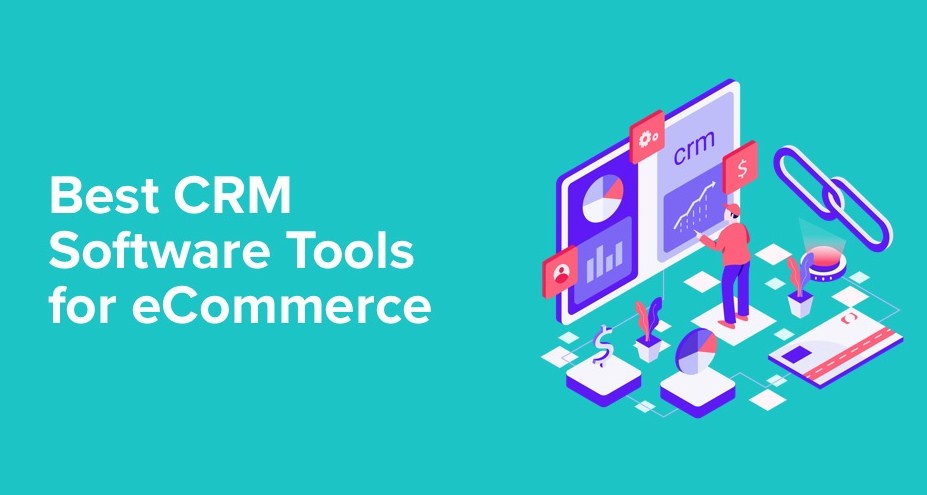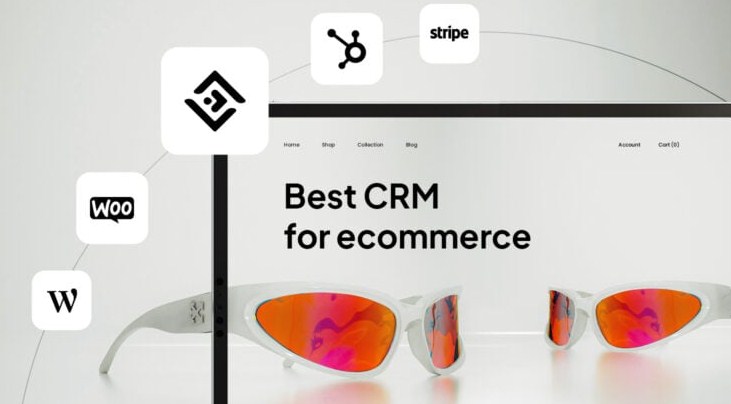Best CRM for Ecommerce – In today’s fast-paced digital world, customer relationship management (CRM) software plays a pivotal role in driving the success of ecommerce businesses. But with so many CRM options available, how do you choose the right one for your business?

In this guide, we’ll dive into the best CRM for ecommerce and explore the features, benefits, and real-world use cases of the top ecommerce CRM solutions. Whether you’re running a small store or a large-scale ecommerce enterprise, this article will provide you with the essential information to help you make an informed decision.
Why Do You Need a CRM for Ecommerce?
Ecommerce businesses thrive on customer relationships. Maintaining these relationships through personalized communication, tracking sales, and automating marketing efforts can lead to increased sales, loyalty, and repeat customers. Without a robust CRM, your business may struggle to maintain organization, follow-ups, and marketing outreach.
Here’s why CRM for ecommerce is essential:
- Customer Insights: Gain deeper insights into your customers’ buying behaviors and preferences.
- Improved Communication: Manage customer interactions across multiple channels.
- Automated Marketing: Set up email campaigns, automate follow-ups, and segment customers based on behaviors.
- Sales Pipeline Management: Track every step of the sales journey from lead to conversion.
Key Benefits of Using the Best CRM for Ecommerce
Using CRM software designed specifically for ecommerce can streamline operations and increase revenue. Let’s break down some key benefits:
1. Enhances Customer Engagement
CRMs help you communicate more effectively with customers by tracking interactions and providing tailored messaging. With personalized recommendations, discounts, and automated follow-ups, you keep your customers engaged and loyal.
2. Increased Sales & Conversion Rates
With CRM systems, you can automate marketing tasks and track sales performance, which helps optimize your sales funnel and increase conversions. By analyzing customer data, CRMs allow you to identify which customers are most likely to convert, and target them with the right offers.
3. Streamlined Customer Support
A CRM integrates all customer interactions in one platform, allowing customer support teams to resolve issues more efficiently. With 24/7 customer service features, chatbots, and automated ticketing, you’ll be able to enhance customer satisfaction and retention.
4. Better Data Insights
Analytics and reporting features in CRMs provide valuable insights into customer behavior, product performance, and marketing ROI. This data is crucial for making data-driven decisions and adjusting your business strategies.
5. Scalability
A good CRM solution grows with your business. Whether you’re starting small or running an established ecommerce store, CRM platforms offer features that can scale to meet the demands of your growing business.
5 Best CRMs for Ecommerce Businesses
Now, let’s explore the top CRM solutions for ecommerce that can take your business to the next level. These CRM tools are feature-rich and cater to the unique needs of ecommerce businesses. Below, we’ll cover what makes each CRM stand out.

1. HubSpot CRM
HubSpot CRM is one of the most popular CRMs for ecommerce businesses. It provides a free plan with advanced features, allowing businesses to manage contacts, track sales, and engage with customers across multiple channels.
Features:
- Contact management and segmentation
- Marketing automation tools
- Email tracking & analytics
- Sales pipeline tracking
- Integration with ecommerce platforms (Shopify, WooCommerce)
Pros:
- Free plan available
- Easy to use with drag-and-drop functionality
- Integrates with a wide range of tools
Cons:
- Some advanced features are locked behind higher-tier plans
- Limited reporting features on the free plan
Price:
- Free Plan available, paid plans starting at $45/month.
2. Salesforce Commerce Cloud
Salesforce Commerce Cloud is a high-end CRM that offers a powerful suite of tools designed specifically for large-scale ecommerce businesses. It’s packed with AI-driven features to enhance customer experience and sales strategies.
Features:
- AI-powered product recommendations
- Customizable storefronts
- Omnichannel engagement tools
- Customer behavior analytics
Pros:
- Robust features for large businesses
- Advanced AI-powered tools
- Scalability and customization options
Cons:
- Expensive
- Steep learning curve
Price:
- Pricing available upon request (Enterprise-level).
3. Klaviyo
Klaviyo is an email marketing-focused CRM for ecommerce stores that integrates seamlessly with popular ecommerce platforms like Shopify and WooCommerce. It helps you send targeted emails based on customer behaviors.
Features:
- Advanced email segmentation
- Automated email flows
- Product recommendations
- Detailed analytics & reporting
Pros:
- Excellent for email marketing
- High customer segmentation capabilities
- Simple interface for beginners
Cons:
- Primarily for email marketing, not a full CRM
- Can be pricey for larger lists
Price:
- Free plan for up to 250 contacts, paid plans starting at $20/month.
4. Zoho CRM
Zoho CRM is a cost-effective solution for ecommerce businesses that need a versatile CRM with automation tools. It’s particularly great for small to medium-sized businesses looking to streamline operations without breaking the bank.
Features:
- Sales automation
- Multichannel communication
- Workflow automation
- AI-powered analytics and forecasting
Pros:
- Affordable for small businesses
- Easy to set up
- Integrates with multiple platforms
Cons:
- User interface can be a bit complex
- Lacks some advanced features of higher-end CRMs
Price:
- Free plan available, paid plans starting at $12/user/month.
5. Pipedrive
Pipedrive is a sales-focused CRM that works well for ecommerce businesses looking to streamline their sales pipeline. With an easy-to-use interface, it helps teams focus on closing deals.
Features:
- Sales pipeline management
- Email and calendar sync
- Customizable workflows
- Lead generation tools
Pros:
- Easy-to-use interface
- Great for sales-driven businesses
- Robust reporting features
Cons:
- Limited features for marketing automation
- Some features require third-party integrations
Price:
- Starts at $15/user/month.
Comparison Table of CRM for Ecommerce
| CRM Solution | Use Case | Pros | Cons | Price |
|---|---|---|---|---|
| HubSpot CRM | Small to medium businesses | Free plan, ease of use, integrations | Limited features on free plan | Free, paid from $45/month |
| Salesforce Commerce Cloud | Large ecommerce businesses | Advanced features, scalability | Expensive, steep learning curve | Custom pricing |
| Klaviyo | Email marketing-heavy businesses | Excellent for email automation | Expensive for large lists | Free for 250 contacts, paid from $20/month |
| Zoho CRM | Small to medium businesses | Affordable, easy to set up | Complex UI, lacks some advanced features | Free, paid from $12/user/month |
| Pipedrive | Sales-driven businesses | Easy to use, robust reporting | Limited marketing features | From $15/user/month |
Where to Buy & How to Buy These CRMs
1. HubSpot CRM
You can get started with HubSpot CRM for free, and upgrade to a paid plan as your business grows.
👉 Buy HubSpot CRM
2. Salesforce Commerce Cloud
For enterprise businesses, Salesforce offers custom pricing based on your needs.
👉 Get Salesforce Commerce Cloud
3. Klaviyo
Klaviyo’s email-focused CRM offers a free plan for small businesses, with premium features available for growing businesses.
👉 Buy Klaviyo
4. Zoho CRM
Zoho offers affordable pricing with a free plan for startups and small businesses.
👉 Buy Zoho CRM
5. Pipedrive
Pipedrive’s CRM is perfect for sales-focused ecommerce businesses, with easy plans starting at $15 per user.
👉 Buy Pipedrive
FAQs
- What is a CRM for ecommerce?
A CRM (Customer Relationship Management) for ecommerce is a tool that helps businesses manage and analyze customer interactions, sales, and data. It enhances marketing, sales, and customer service processes. - Why should I use a CRM for my ecommerce store?
A CRM helps you manage customer data, automate marketing, track sales, and improve customer service. It ultimately helps boost sales, increase customer loyalty, and streamline operations. - What are the key features of the best CRM for ecommerce?
Key features include sales pipeline management, email marketing automation, customer segmentation, behavior analytics, and integrations with ecommerce platforms. - How do I choose the right CRM for my business?
Consider factors like your business size, the complexity of your sales process, the level of automation you need, and your budget. - Can I use a CRM to improve customer service?
Yes, CRMs provide tools for tracking customer interactions, resolving issues, and providing personalized support, which can greatly enhance customer satisfaction.
In conclusion, choosing the best CRM for ecommerce depends on your business needs. Whether you need advanced AI features, seamless email marketing, or a simple, cost-effective solution, there’s a CRM out there for you. Take advantage of free trials to see which one suits your needs the best!
Read More >>>
- Top Marketo Competitors You Should Consider in 2025: Features, Benefits & Pricing Explained
- Top Salesforce Marketing Cloud Competitors: Features, Benefits, Pricing & Detailed Comparison (2025)